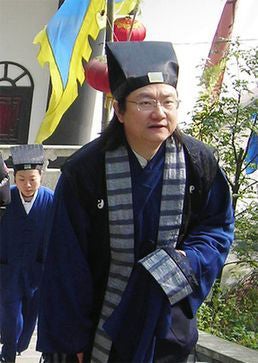The tao of deception: China's 'miracle' priest Li Yi accused of faking it

Your support helps us to tell the story
From reproductive rights to climate change to Big Tech, The Independent is on the ground when the story is developing. Whether it's investigating the financials of Elon Musk's pro-Trump PAC or producing our latest documentary, 'The A Word', which shines a light on the American women fighting for reproductive rights, we know how important it is to parse out the facts from the messaging.
At such a critical moment in US history, we need reporters on the ground. Your donation allows us to keep sending journalists to speak to both sides of the story.
The Independent is trusted by Americans across the entire political spectrum. And unlike many other quality news outlets, we choose not to lock Americans out of our reporting and analysis with paywalls. We believe quality journalism should be available to everyone, paid for by those who can afford it.
Your support makes all the difference.A Taoist priest who has attained celebrity status in China for his claims of magical powers has been accused of fraud and ordered to stop recruiting students to his school.
Li Yi, abbot of Shaolong Temple at Jinyun Mountain in Chongqing, has gathered a following of 30,000 disciples since setting himself up as a Grand Master. His followers include a string of celebrities, from software developers to pop stars.
As a regular fixture on Chinese TV, he won a place in the celebrity firmament, even if some purists found his soft features and absence of a beard hard to reconcile with the more traditional image of Taoism. And while the ancient Taoist faith is more normally concerned with the Tao, or "way", and its expression in unity and opposites – Yin and Yang – Mr Li's approach appears to have been a little unorthodox.
He is accused of faking various "miracles" such as pretending to be submerged under water for two hours, and using his heels to breathe. He was later said to have been discovered inside a glass container, with a distinctly unsupernatural supply of air. The abbot is also accused of using a huge 220V of electricity to cure the sick, which authorities fear could be harmful.
Cults like Mr Yi's are increasingly popular in China, which as a communist state is fiercely secular but where lingering affection for traditional beliefs, combined with modern desire for spiritual relevance in a materialist society, has seen a revival in various beliefs, all marshalled by the Communist Party. This has benefited Taoism, and other organised beliefs such as Buddhism and Christianity. But it has given rise to a string of accusations of fakery.
The Religious Affairs Bureau of Beibei district in the city is investigating after a flurry of online accusations of charlatanism, the Xinhua news agency reported. Mr Li was even accused of rape at one point, though that accusation proved groundless.
Mr Li set up the temple with local government approval three years ago, one year after he became a Taoist. He charged 390 yuan for a "three-day experience course" and 9,000 yuan (£865/€1048) for a week-long course.
Previously, Mr Li had run a circus after graduating from Middle School. Fang Zhouzi, a commentator known in China for exposing religious frauds, said the reason why religious charlatans become popular is because people are obsessed with their health, the public health service is poor and there was a general ignorance about science and group psychology.
"It started with a few big names, and then people followed them. But now celebrities are trying to stay away from Li Yi," he told Xinhua. He said that in the 1990s, many fraudsters would masquerade as masters of tai chi but were eventually exposed, and in recent years they had come back in another guise, as Taoist "supernatural beings".
Mr Li, whose real name is Li Jun, also rose to vice-presidency of the Chinese Taoist Association, though he has since resigned that position.
Mr Li is only the latest religious figure to be accused of fraud. Earlier this year, Zhang Wuben, 47, a once-popular diet therapist, was found to have faked his nutritionist qualifications. He said mung beans and aubergine could cure diabetes and cancer.
Mr Li's has reportedly been giving consultations behind closed doors for a few months, during which time he turned his phone off and declined visitors. His whereabouts are unknown.
Join our commenting forum
Join thought-provoking conversations, follow other Independent readers and see their replies
Comments